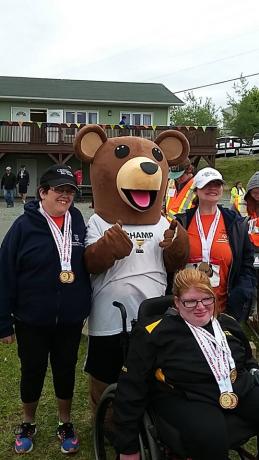
Special Olympics Newfoundland and Labrador (SONL)
In the late 1980s, Helen Bidgood-Parsons and Kimberley Bowe were coaches with the YMCA-adapted aquatics program at Wedgewood Park Community Centre. Helen and Kim were aware of the Special Olympics movement and every time they were in Toronto they visited with the National Executive Director, Mark Woods to talk about starting a Special Olympics program in Newfoundland and Labrador. In September 1985, Mark had good news for the duo; Mr. Tom Woodford of Tom Woodford Ltd had just seen a movie about Special Olympics and wanted to know how to start the organization in Newfoundland and Labrador. Mr. Woodford was involved in the Newfoundland and Labrador Automobile Dealers Association and offered to donate $5 for every new car they sold! This enabled the adapted aquatics program to send 4 athletes (Bernadette Beehan, Jimmy Hunt, Sheilagh Murphy and Margaret Rahal) to the 1986 National Games in Calgary.
With the athletes from the adapted aquatics, their coaches, and the support from the ADANL a committee was formed with Mr. Sam Walters as president. Sam Walters from RBC had the right mix of corporate experience and contacts, as well as the ability to galvanize a passionate group of volunteers. It was a core group of individuals that were the early drivers of Special Olympics Newfoundland and Labrador. Starting with a small group of committed athletes, coaches and supporters, SONL has since grown to over 800 athletes, 400 volunteer coaches and many corporate sponsors and supporters.
Special Olympics Canada
The Canadian connection
The Special Olympics movement was founded by Eunice Kennedy Shriver, with the very first event held in 1968 on Soldier Field in Chicago. But the competition was inspired by discoveries made by a Canadian researcher.
In the early 1960s, a group of students at Toronto’s Beverley School became the test group for Dr. Frank Hayden, a sport scientist at the University of Toronto. Dr. Hayden was studying the effects of regular exercise on the fitness levels of children with an intellectual disability.
Dr. Hayden’s research was nothing short of groundbreaking. It challenged the prevailing mindset of the day – one that claimed that it was the disability itself that prevented children from fully participating in play and recreation. Through rigorous scientific methods, Dr. Hayden proved that it was simply a lack of opportunity to participate. Given that opportunity, people with an intellectual disability could acquire the necessary skills to participate in sport and become physically fit.
In other words: sport could have a transformative effect on the lives of those with an intellectual disability.
Transforming the world
Dr. Hayden’s proposal for a National sport competition caught the attention of Eunice Kennedy Shriver, serving as inspiration for the inaugural Special Olympics competition in 1968 in Chicago. Canada was represented by a group of 12 students and a teacher from the Beverley School, as well as Toronto Maple Leafs captain George Armstrong, serving as Honorary Team Captain.
Dr. Hayden also served as the Chicago event’s General Director and eventually went on to work for the Washington-based Kennedy Foundation as the Director of Physical Education and Recreation, working alongside Ms. Kennedy Shriver.
Making history at home
Harry “Red” Foster, a Canadian broadcast legend and philanthropist, was in Chicago in 1968 to witness the birth of the Special Olympics movement. He was inspired by what he saw and experienced and worked tirelessly to bring this global force back to Canada.
Special Olympics
We invite you to learn more about Special Olympics founder, Eunice Kennedy Shriver by visiting Special Olympics International website.
